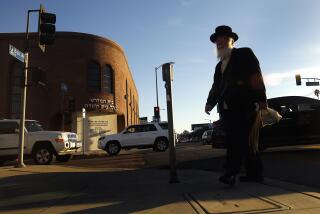Ceremony Marks a Long-Delayed Rite of Passage
- Share via
When Molly Wasserman walked into Temple Ramat Zion in Northridge Saturday, her 61-year wait was over.
“I did a lot of crying,” said the 74-year-old grandmother, dressed in some of her finest clothes for the occasion.
Twenty-nine other women joined Wasserman in shedding tears of joy. As 800 proud friends and family members watched, the women celebrated their bat mitzvahs, which usually mark a 13-year-old girl’s passage into Jewish adulthood.
For most of these women, the bat mitzvah did not exist when they were young because Jewish tradition called for only men to celebrate the rite of passage. Unlike their fathers, brothers and even sons who had observed their bar mitzvahs, the women never learned to read Hebrew or immerse themselves in a rigorous study of Judaism.
It was only in the past 25 to 30 years that Jewish girls in Reform and Conservative synagogues routinely began having bat mitzvahs.
Without the formal training, Wasserman said, “I sat through the services and looked like a dummy.”
Many of the women said they were motivated to attend classes by a need for a sense of belonging and a desire to reaffirm the importance of Judaism in their lives. As each took her turn to stand and talk to the congregation, many choked back tears and took a few moments to regain their voices.
“It was something I always wanted to do,” Julie Steinschriber, 39, said. “I always felt uncomfortable in the synagogue. By learning a little Hebrew and some prayers it made me feel like I belong. It gave me permission to belong.”
Rabbi Solomon Rothstein congratulated the group, which included four men who had postponed their bar mitzvahs, for persevering and completing “unfinished business.”
“I know there is a lot in your hearts,” he said. “Three words sum it up: pride, joy and excitement. That’s what we all feel.”
The class met once a week for almost a year. The students learned Hebrew and became familiar with Jewish customs and holidays. During Saturday’s service, one woman observed that while many 13-year-olds can absorb Hebrew like a sponge, for her the experience was more like trying to absorb it with a brick.
Emma Cohen, the mother of four boys, said she studied every day and even took her homework along on her Thanksgiving vacation. After the service ended, she was still so excited that her hands were ice cold.
“It really was an accomplishment,” Cohen said. “I feel so close to God.”
Howard Langfus, the president of the congregation, said he knows of no other synagogue in Los Angeles that had so many people participating in its adult “b’nai mitzvah” class.
What’s happening at Ramat Zion is part of a growing trend, said Rabbi Paul Dubin, executive vice president of the Southern California Board of Rabbis. More women are taking advantage of opportunities they didn’t have in the past, he said.
Rothstein predicted that the next class would be twice as big and jokingly remarked that the service would have to be held in the Dorothy Chandler Pavilion to accommodate the crowd of well-wishers.
Noting that the Sabbath celebration fell on March 17, Rothstein said, “The world may have St. Patrick’s Day, but we have the b’nai mitzvah class of 1990, and we don’t need Schnapps to feel happy.”
More to Read
Sign up for Essential California
The most important California stories and recommendations in your inbox every morning.
You may occasionally receive promotional content from the Los Angeles Times.













